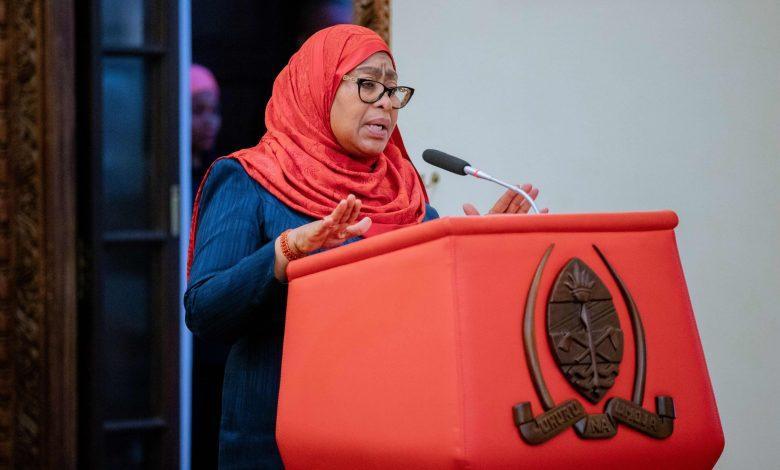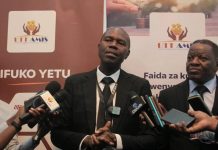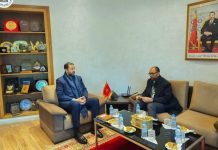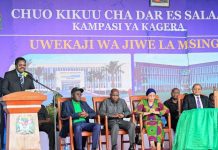Africa-Press – Tanzania. PRESIDENT Samia Suluhu Hassan has directed authorities in charge of overseeing the country’s uranium resources to begin immediate preparations for production, including using the mineral to generate electricity for domestic use.
She made the call yesterday while swearing in newly appointed leaders at State House in Dar es Salaam.
President Samia said Tanzania can no longer afford to sit on its uranium deposits while other countries are using the resource as a key component of their energy mix.
She described nuclear power as a viable solution to Tanzania’s growing energy needs, adding that the country’s current uranium reserves, estimated at 58,500 tonnes, should first benefit Tanzanians before any exports are considered.
“We’ve had uranium for years and people convinced us it’s dangerous,” she said. “Yet er countries are using it as a primary energy source. We must manage the Tunduru project so that the investors can start working on it. If they want to export it later, fine, but we must benefit first.”
She said that the uranium project should not remain dormant. With more exploration, the country could uncover even more reserves.
The President also drew attention to the government’s ambition to become self-sufficient in electricity and eventually sell surplus power to neighbouring countries like Zambia.
She said that while Tanzania imports electricity from Ethiopia, it has the resources to reverse that trend.
The subject of uranium resurfaced when President Samia addressed Lazaro Twange, the newly appointed Director General of TANESCO. As she outlined the major tasks ahead for the national power utility, she included the development of the Tunduru uranium project as a key priority.
“You’ve been appointed to head TANESCO, a strategic institution that holds the country’s energy security. Among your responsibilities is to oversee diverse sources of electricity and one of them is uranium. It’s time to move from hesitation to production,” she said.
During Namibian President Netumbo Nandi-Ndaitwah’s visit to Tanzania, the use of uranium for electricity generation was one of the key topics discussed with President Samia. Namibia is the world’s third-largest producer of uranium, making it a major player in the global nuclear energy sector.
She added that developing nuclear power from Tanzania’s uranium could secure long-term energy reliability and help position the country as a power exporter. Mr Twange was instructed to collaborate closely with the Ministry of Energy to make progress on this front.
President Samia reminded him that Tanzania has already made significant investments in expanding electricity generation through hydropower and gas.
With the Julius Nyerere Hydropower Project (JNHPP) completed, a shift toward other energy sources, including renewables and nuclear, is necessary to stabilise the national grid and meet growing industrial demand.
“Our biggest issue is not electricity generation, but transmission,” she said, adding “there are delays in taking power to the north and the southern highlands. These projects must start without further excuses.”
She instructed Twange to supervise the construction of substations and clean up the billing system, noting that inefficiencies and internal interests have compromised service delivery.
“Stand in the middle, implement these projects properly. Don’t fall for people’s personal interests. Make sure the law and company policies guide every step,” she said.
Addressing Professor Tumaini Nagu, the new Deputy Permanent Secretary in the President’s Office for Regional Administration and Local Government (PORALG) – Health, President Samia asserted the importance of expanding access to quality healthcare.
“You are taking over a major responsibility. We’ve seen a significant increase in dispensaries, health centres and district hospitals. Although equipment, supplies and medical personnel have been dispatched to health facilities, significant challenges persist. Effective management is crucial. Go manage this well,” she said.
She also tasked Prof Nagu with overseeing the renovation of old hospitals to match the standards of newly built ones and to eliminate unnecessary bureaucracy in procurement.
Prof Nagu was reminded to work hand-in-hand with local politicians, especially MPs and councillors, who face unique community challenges. “Find solutions for citizens’ problems and follow the law in procurement processes,” she said.
For Dr Fred Msemwa, appointed Executive Secretary of the Planning Commission and Dr Blandina Kilama, the Deputy Executive Secretary, the President described the duo as well-matched to lead national development coordination.
“The country is finalising its Vision 2050. Your Commission will oversee its implementation,” she said. “You must also ensure that sectoral plans are aligned with national objectives and that projects are well-coordinated.”
The President urged them to maintain strong internal coordination with their parent ministry while ensuring that all incoming investment projects are properly evaluated and executed according to agreed contracts.
Justice John Mgeta, appointed to the Public Ethics Council, was given a serious charge to restore ethics and patriotism in the public service.
President Samia criticised the increasing tendency among public servants to mishandle confidential information and act irresponsibly with matters of national importance.
“Some believe leaking files on their phones is somehow targeting the President, but in reality, they’re destroying the nation. There’s a lack of patriotism and that’s unacceptable,” she said.
She commended the Council for its new initiative to instil public service values in schoolchildren. “Start young, instil integrity in the next generation of leaders,” she added.
President Samia also called on all the newly appointed leaders to honour their oaths, work collaboratively and focus on delivering for Tanzanians.
“The responsibility to build and protect this nation lies with us. No one else will do it for us,” she said
For More News And Analysis About Tanzania Follow Africa-Press







